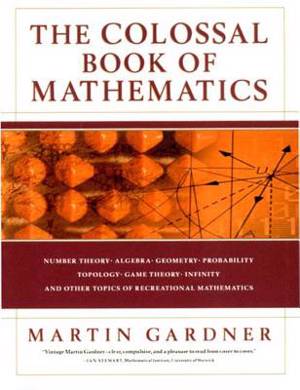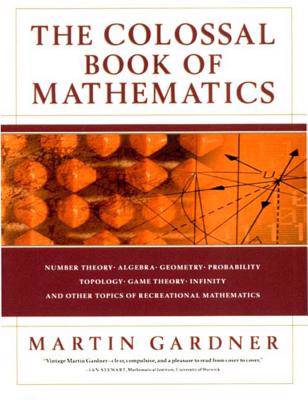
- Retrait gratuit dans votre magasin Club
- 7.000.000 titres dans notre catalogue
- Payer en toute sécurité
- Toujours un magasin près de chez vous
- Retrait gratuit dans votre magasin Club
- 7.000.000 titres dans notre catalogue
- Payer en toute sécurité
- Toujours un magasin près de chez vous
The Colossal Book of Mathematics
Classic Puzzles, Paradoxes, and Problems
Martin Gardner
Livre relié | Anglais
55,45 €
+ 110 points
Description
Whether discussing hexaflexagons or number theory, Klein bottles or the essence of "nothing," Martin Gardner has single-handedly created the field of "recreational mathematics." The Colossal Book of Mathematics collects together Gardner's most popular pieces from his legendary "Mathematical Games" column, which ran in Scientific American for twenty-five years. Gardner's array of absorbing puzzles and mind-twisting paradoxes opens mathematics up to the world at large, inspiring people to see past numbers and formulas and experience the application of mathematical principles to the mysterious world around them. With articles on topics ranging from simple algebra to the twisting surfaces of Mobius strips, from an endless game of Bulgarian solitaire to the unreachable dream of time travel, this volume comprises a substantial and definitive monument to Gardner's influence on mathematics, science, and culture.
In its twelve sections, The Colossal Book of Math explores a wide range of areas, each startlingly illuminated by Gardner's incisive expertise. Beginning with seemingly simple topics, Gardner expertly guides us through complicated and wondrous worlds: by way of basic algebra we contemplate the mesmerizing, often hilarious, linguistic and numerical possibilities of palindromes; using simple geometry, he dissects the principles of symmetry upon which the renowned mathematical artist M. C. Escher constructs his unique, dizzying universe. Gardner, like few thinkers today, melds a rigorous scientific skepticism with a profound artistic and imaginative impulse. His stunning exploration of "The Church of the Fourth Dimension," for example, bridges the disparate worlds of religion and science by brilliantly imagining the spatial possibility of God's presence in the world as a fourth dimension, at once "everywhere and nowhere."
With boundless wisdom and his trademark wit, Gardner allows the reader to further engage challenging topics like probability and game theory which have plagued clever gamblers, and famous mathematicians, for centuries. Whether debunking Pascal's wager with basic probability, making visual music with fractals, or uncoiling a "knotted doughnut" with introductory topology, Gardner continuously displays his fierce intelligence and gentle humor. His articles confront both the comfortingly mundane--"Generalized Ticktacktoe" and "Sprouts and Brussel Sprouts"--and the quakingly abstract--"Hexaflexagons," "Nothing," and "Everything." He navigates these staggeringly obscure topics with a deft intelligence and, with addendums and suggested reading lists, he informs these classic articles with new insight.
Admired by scientists and mathematicians, writers and readers alike, Gardner's vast knowledge and burning curiosity reveal themselves on every page. The culmination of a lifelong devotion to the wonders of mathematics, The Colossal Book of Mathematics is the largest and most comprehensive math book ever assembled by Gardner and remains an indispensable volume for the amateur and expert alike.
In its twelve sections, The Colossal Book of Math explores a wide range of areas, each startlingly illuminated by Gardner's incisive expertise. Beginning with seemingly simple topics, Gardner expertly guides us through complicated and wondrous worlds: by way of basic algebra we contemplate the mesmerizing, often hilarious, linguistic and numerical possibilities of palindromes; using simple geometry, he dissects the principles of symmetry upon which the renowned mathematical artist M. C. Escher constructs his unique, dizzying universe. Gardner, like few thinkers today, melds a rigorous scientific skepticism with a profound artistic and imaginative impulse. His stunning exploration of "The Church of the Fourth Dimension," for example, bridges the disparate worlds of religion and science by brilliantly imagining the spatial possibility of God's presence in the world as a fourth dimension, at once "everywhere and nowhere."
With boundless wisdom and his trademark wit, Gardner allows the reader to further engage challenging topics like probability and game theory which have plagued clever gamblers, and famous mathematicians, for centuries. Whether debunking Pascal's wager with basic probability, making visual music with fractals, or uncoiling a "knotted doughnut" with introductory topology, Gardner continuously displays his fierce intelligence and gentle humor. His articles confront both the comfortingly mundane--"Generalized Ticktacktoe" and "Sprouts and Brussel Sprouts"--and the quakingly abstract--"Hexaflexagons," "Nothing," and "Everything." He navigates these staggeringly obscure topics with a deft intelligence and, with addendums and suggested reading lists, he informs these classic articles with new insight.
Admired by scientists and mathematicians, writers and readers alike, Gardner's vast knowledge and burning curiosity reveal themselves on every page. The culmination of a lifelong devotion to the wonders of mathematics, The Colossal Book of Mathematics is the largest and most comprehensive math book ever assembled by Gardner and remains an indispensable volume for the amateur and expert alike.
Spécifications
Parties prenantes
- Auteur(s) :
- Editeur:
Contenu
- Nombre de pages :
- 736
- Langue:
- Anglais
Caractéristiques
- EAN:
- 9780393020236
- Date de parution :
- 17-09-01
- Format:
- Livre relié
- Format numérique:
- Genaaid
- Dimensions :
- 184 mm x 233 mm
- Poids :
- 1310 g







